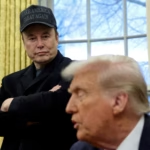Ratan Tata, the iconic Indian industrialist who transformed the Tata Group into a global conglomerate, passed away at the age of 86. His death was announced by Natarajan Chandrasekaran, the current Chairman of Tata Group, who lauded Tata as “a truly uncommon leader” whose influence extended beyond the Tata empire, shaping India’s modern industrial landscape.
A Visionary Leader Who Expanded the Tata Legacy- Ratan Tata

As the Chairman of Tata Sons from 1991 to 2012, and again as interim chairman in 2016, Ratan Tata steered the 156-year-old conglomerate into the global arena. Under his leadership, the group grew into a multi-national enterprise with operations in more than 100 countries, reporting $165 billion in revenue for the fiscal year ending in March 2024. His vision and determination enabled the Tata Group to become a global powerhouse, encompassing industries as diverse as steel, software, automotive, telecommunications, and consumer goods.
High-Profile Acquisitions and Global Expansion

Ratan Tata is best remembered for his bold acquisitions, which reversed India’s colonial history. In 2007, Tata Steel acquired the British steelmaker Corus Group for $13 billion, and in 2008, Tata Motors bought Jaguar Land Rover from Ford for $2.3 billion. These high-profile acquisitions marked the Tata Group’s arrival on the global stage, although they posed significant challenges due to the global financial crisis.
Key Milestones in Tata’s Leadership

Tata’s leadership was marked by several milestone achievements:
- The development of the Tata Nano, the world’s cheapest car, aimed at revolutionizing affordable transportation in India.
- The launch of India’s first locally built passenger car, the Tata Indica, in 1998.
- The expansion of Tata Consultancy Services (TCS), now one of the largest IT services firms in the world.
- The recent joint venture with Taiwan’s Powerchip Semiconductor Manufacturing Corp. for a $11 billion chip fabrication plant in India.
- Tata Sons’ acquisition of Air India in 2021, returning the airline to its original founder after nearly 90 years of state ownership.
Overcoming Challenges: Terrorist Attack and Business Battles
Tata’s career was not without its share of adversity. In 2008, terrorists targeted Tata’s flagship Taj Mahal Palace Hotel in Mumbai, leading to a tragic four-day siege in which 31 people, including 11 hotel staff, lost their lives. Ratan Tata personally visited the families of all the victims, and a memorial still stands at the hotel to honor their memory.
Tata also fought two intense battles for control of the conglomerate during his tenure. In 1991, he faced opposition from long-time executives, and in 2016, after his retirement, he returned to oust his successor, Cyrus Mistry, ensuring his legacy remained intact.
A Life Dedicated to Philanthropy and Innovation
Beyond his business acumen, Ratan Tata was known for his philanthropic endeavors. Through Tata Trusts, which controls about 66% of Tata Sons, Tata contributed to numerous social and humanitarian causes, including education, healthcare, and rural development. He was also a staunch supporter of Indian startups, including Ola Electric Mobility and Goodfellows, a platform aimed at fostering intergenerational friendships.
Early Life and Career Beginnings
Born on December 28, 1937, in Mumbai, Ratan Tata was raised by his grandmother after his parents divorced when he was 10. After earning a degree in architecture from Cornell University in 1962, he returned to India to work for Tata Group, persuaded by J.R.D. Tata, the then-chairman of Tata Sons. Groomed by J.R.D., Ratan Tata worked across various units before taking the helm in 1991.
Legacy of a Titan
Ratan Tata leaves behind a legacy of visionary leadership and commitment to ethical business practices. His impact on India’s economy and the Tata Group’s global footprint is immeasurable. Although he never married and had no children, his passing leaves a void at the helm of Tata Trusts, a significant force in India’s philanthropic landscape.
In his final years, Tata remained a passionate advocate for innovation, backing startups and championing the causes of women and underprivileged communities. His contributions to India and the world will be remembered for generations to come.









